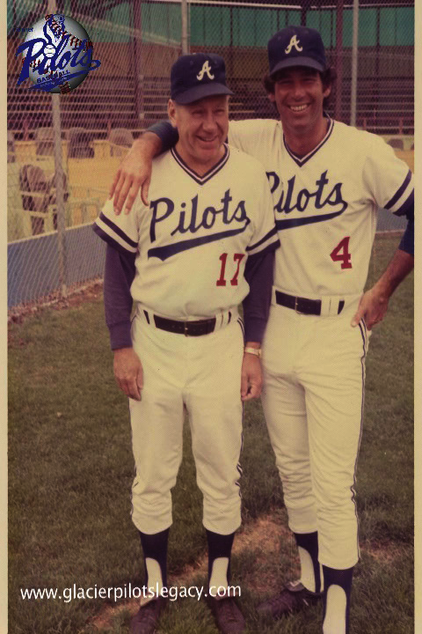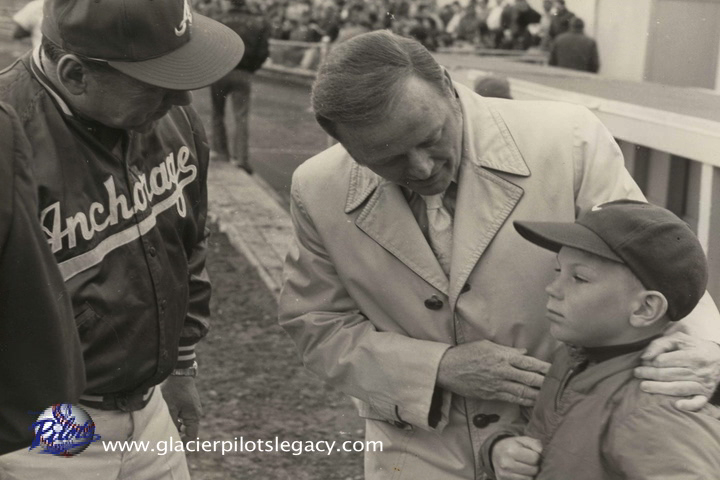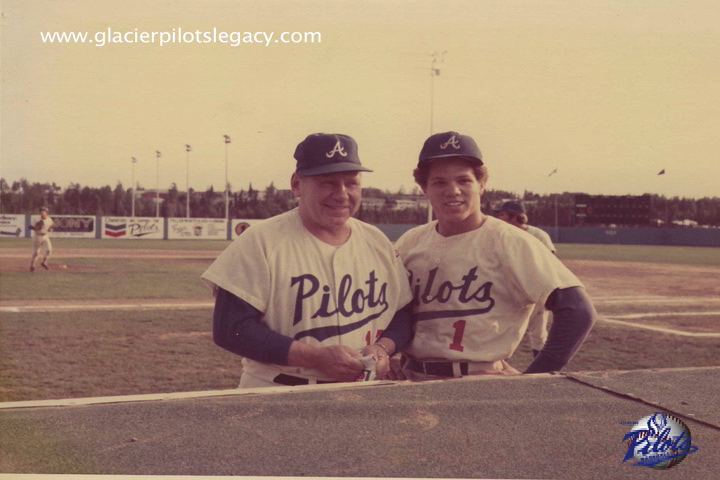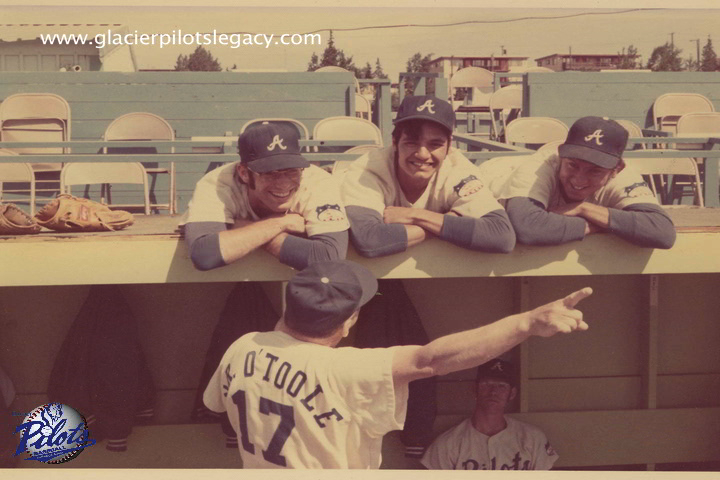Mulcahy Memories |
Fan photos and notes of yesterday. We encourage all Glacier Pilots and Alumni Players to submit photos, films, and videos to this growing collection of Anchorage Glacier Pilots baseball history. Help us preserve the Glacier Pilots colorful past playing baseball in the Last Frontier!
Please use the Contact and Links page or visit our Facebook page to submit. Thank you.
Please use the Contact and Links page or visit our Facebook page to submit. Thank you.
O'Toole Familyphotos courtesy of Patrick O'Toole
1974- Jack O'Toole and Augie Garrido. Auggie was the Asst. Coach that year to Head Coach Paul Deece. Augie was the Glacier Pilots Head Coach 1975 and 1976.
Jack O'TooleMarch 20, 2002, Anchorage Daily News- O'Toole, the colorful coach whose off-color humor charmed three decades worth of Anchorage Glacier Pilots baseball players and fans, died Sunday in Anchorage. He was 80.
O'Toole entertained legions of people at Mulcahy Stadium, where he manned the first-base coaching box for the Pilots since 1971. A former pro player whose major-league dreams were cut short by World War II, O'Toole helped start the Pilots in 1969 and two years later became an assistant coach. "He's the history of the Pilots," said Dick Lobdell, the Pilots' longtime radio broadcaster. "He's the last one, the oldest one. O'Toole was a favorite among fans and players. Before games, he would gather the players around him for what looked like a team meeting but was in fact a joke-of-the-day session. Although poor health limited his appearances the last few years, any time he made it to the park, the pre-game joke ritual was observed. "So many of them were off color that I don't remember them," said former Pilots pitcher Dan Boone of El Cajon, Calif., who met O'Toole when he came to play for the Pilots in 1974. "But they made everybody laugh at the time." |
Jack O'Toole, Lt. Gov. Red Boucher & 7 year old Patrick O'Toole in 1969
Jack O'Toole and Bump Wills. Bump played for the Glacier Pilots 1971- 1973.
Jack O'Toole (notice the back of the uniform says "Mr. O'Toole", with Bob DiPietro, Ruben Garcia and Dave Oliver
|
O'Toole had a knack for putting on a show and making people laugh. A professional musician, he was a showman whether playing the drums in a band or playing the crowd during a confrontation with an umpire.
O'Toole was ejected from a game as recently as 1999, when he kicked dirt on the plate and told the umpire that his strike zone resembled "what you seldom see in a garage anymore" -- meaning horse manure.
O'Toole seldom lacked for a one-liner. One of them, directed to a pair of umpires during a 1989 game at Mulcahy, led to an ejection. "I said I couldn't believe how unequipped they came to the game. One left his (white) cane at home and the other left his seeing-eye dog," O'Toole said.
"Jack was always one to crack a joke. He kept everybody lively," said Boone, who spent eight summers in Alaska playing for the Pilots and Fairbanks Goldpanners. "He was always talking to the ball players and trying to make them be relaxed and just enjoy their time there. He was always a person you could talk to."
Fans loved him, too, even if they sometimes ribbed him. Slowed by age in the last several years, O'Toole was a favorite target of Mat-Su Miners fans at Hermon Brothers Field in Palmer. When O'Toole and the Pilots played there, every half-inning featured a delay as the white-haired O'Toole made his laborious walk between the visitors dugout at third base and the coaching box at first base. Mat-Su fans filled the delay by giving O'Toole grief, and O'Toole delighted them by giving it right back.
A consummate baseball man, O'Toole attended his first major-league game at age 4 and skipped school as a 14-year-old to watch the Detroit Tigers play in the 1934 World Series.
In 1939 he signed a minor-league contract worth $60 a month and a room in a boarding house, courtesy of a baseball team in Waycross, Ga. He made it to Class AA ball by 1941, but then the war ended his baseball career. He flew bombers over Germany and received the Distinguished Flying Cross before being stationed at Shemya on the Aleutian Islands.
O'Toole was discharged in 1946 and never left Alaska, where he built a busy life. He worked as a musician and often performed with his wife, singer Katie O'Toole, who died in 1999. He worked in the restaurant and bar business and owned the Pump House and O'Toole's. He played on a national-championship curling club and was a longtime member of the Elks Club.
But baseball was his first love, his true love. "I come in there somewhere around second," Katie said in a 1996 interview.
Besides coaching the Pilots, O'Toole worked as a scout for the Montreal Expos for the last two decades and often convinced them or other clubs to take a look at local players.
His love of the game spanned eight decades, a longevity defined by two photographs treasured by O'Toole. In one, he is a child posing with Babe Ruth. In another, he is 60-something and posing with Mark McGwire.
In 1993, O'Toole was 73 and the survivor of two heart attacks and open-heart surgery, yet he donned his blue-and-white Pilots uniform every night that summer.
"Baseball keeps me young," he said at the time. "And my wife won't let me chew tobacco at home."
O'Toole was ejected from a game as recently as 1999, when he kicked dirt on the plate and told the umpire that his strike zone resembled "what you seldom see in a garage anymore" -- meaning horse manure.
O'Toole seldom lacked for a one-liner. One of them, directed to a pair of umpires during a 1989 game at Mulcahy, led to an ejection. "I said I couldn't believe how unequipped they came to the game. One left his (white) cane at home and the other left his seeing-eye dog," O'Toole said.
"Jack was always one to crack a joke. He kept everybody lively," said Boone, who spent eight summers in Alaska playing for the Pilots and Fairbanks Goldpanners. "He was always talking to the ball players and trying to make them be relaxed and just enjoy their time there. He was always a person you could talk to."
Fans loved him, too, even if they sometimes ribbed him. Slowed by age in the last several years, O'Toole was a favorite target of Mat-Su Miners fans at Hermon Brothers Field in Palmer. When O'Toole and the Pilots played there, every half-inning featured a delay as the white-haired O'Toole made his laborious walk between the visitors dugout at third base and the coaching box at first base. Mat-Su fans filled the delay by giving O'Toole grief, and O'Toole delighted them by giving it right back.
A consummate baseball man, O'Toole attended his first major-league game at age 4 and skipped school as a 14-year-old to watch the Detroit Tigers play in the 1934 World Series.
In 1939 he signed a minor-league contract worth $60 a month and a room in a boarding house, courtesy of a baseball team in Waycross, Ga. He made it to Class AA ball by 1941, but then the war ended his baseball career. He flew bombers over Germany and received the Distinguished Flying Cross before being stationed at Shemya on the Aleutian Islands.
O'Toole was discharged in 1946 and never left Alaska, where he built a busy life. He worked as a musician and often performed with his wife, singer Katie O'Toole, who died in 1999. He worked in the restaurant and bar business and owned the Pump House and O'Toole's. He played on a national-championship curling club and was a longtime member of the Elks Club.
But baseball was his first love, his true love. "I come in there somewhere around second," Katie said in a 1996 interview.
Besides coaching the Pilots, O'Toole worked as a scout for the Montreal Expos for the last two decades and often convinced them or other clubs to take a look at local players.
His love of the game spanned eight decades, a longevity defined by two photographs treasured by O'Toole. In one, he is a child posing with Babe Ruth. In another, he is 60-something and posing with Mark McGwire.
In 1993, O'Toole was 73 and the survivor of two heart attacks and open-heart surgery, yet he donned his blue-and-white Pilots uniform every night that summer.
"Baseball keeps me young," he said at the time. "And my wife won't let me chew tobacco at home."




